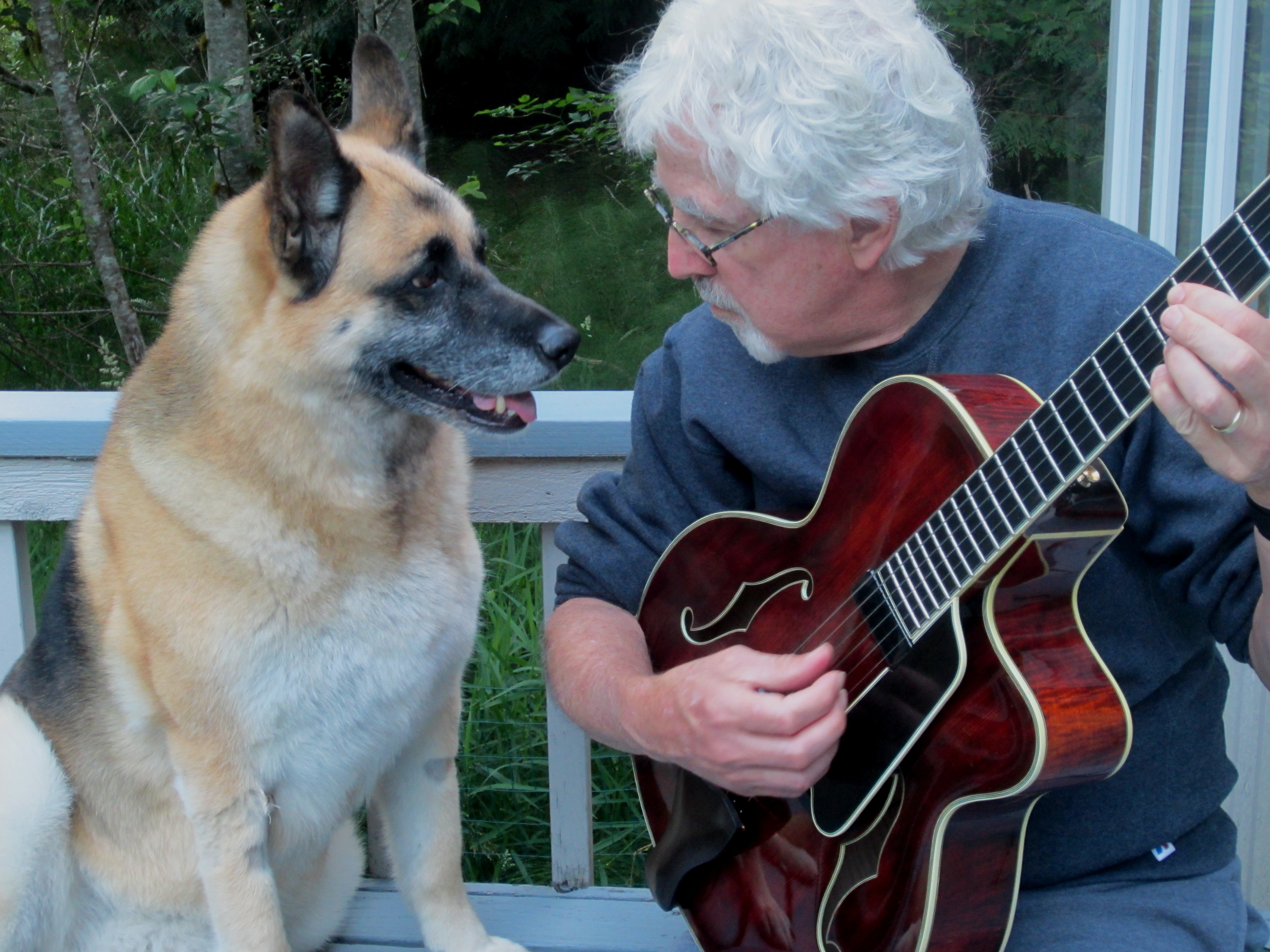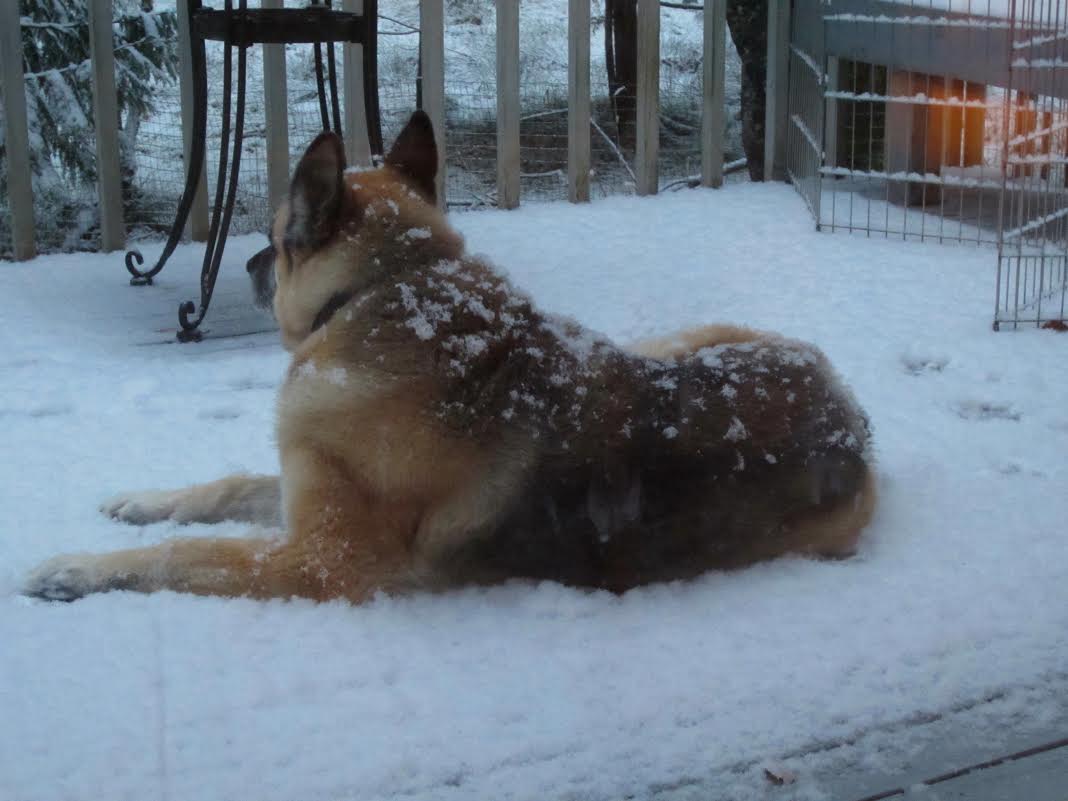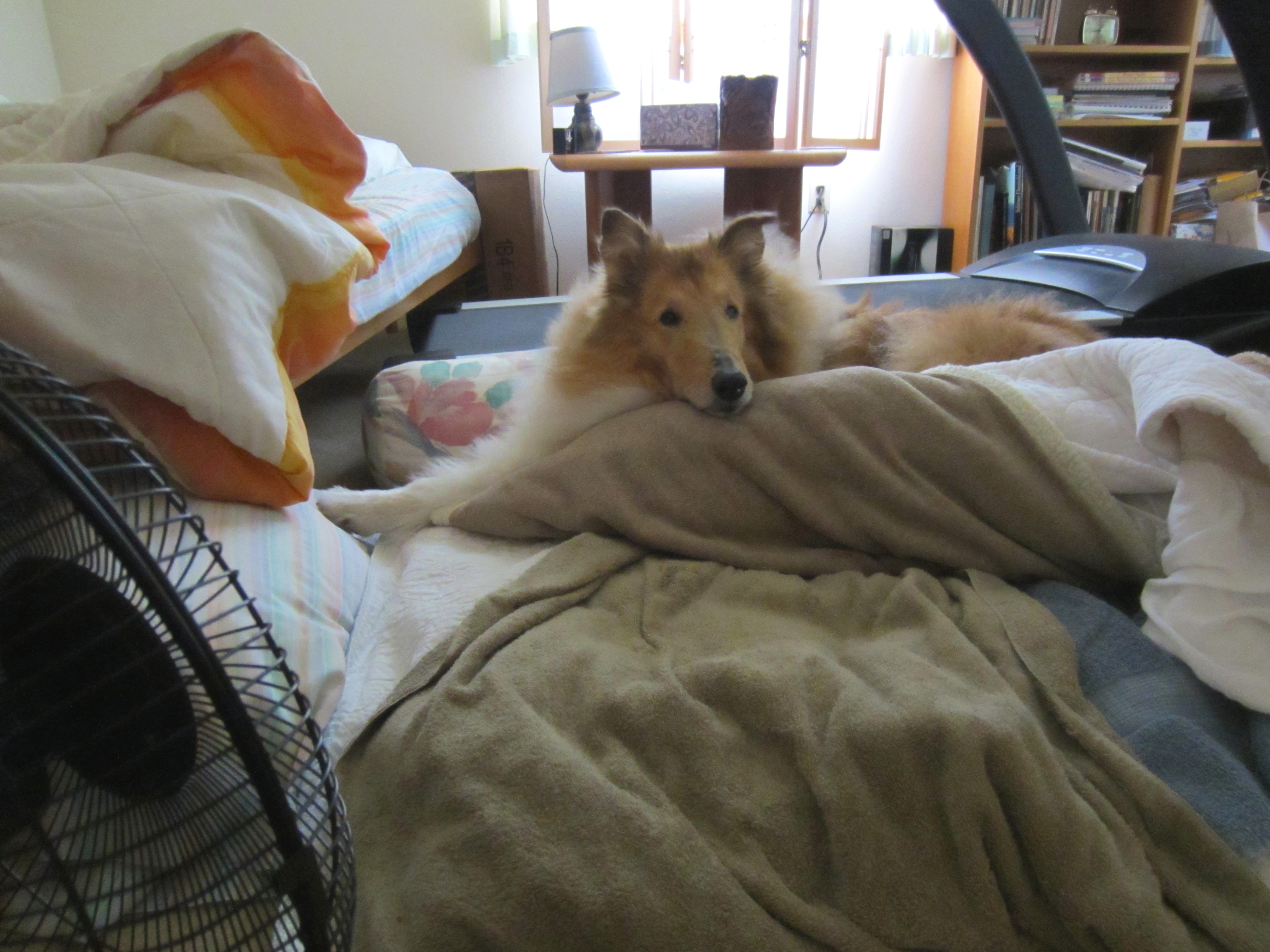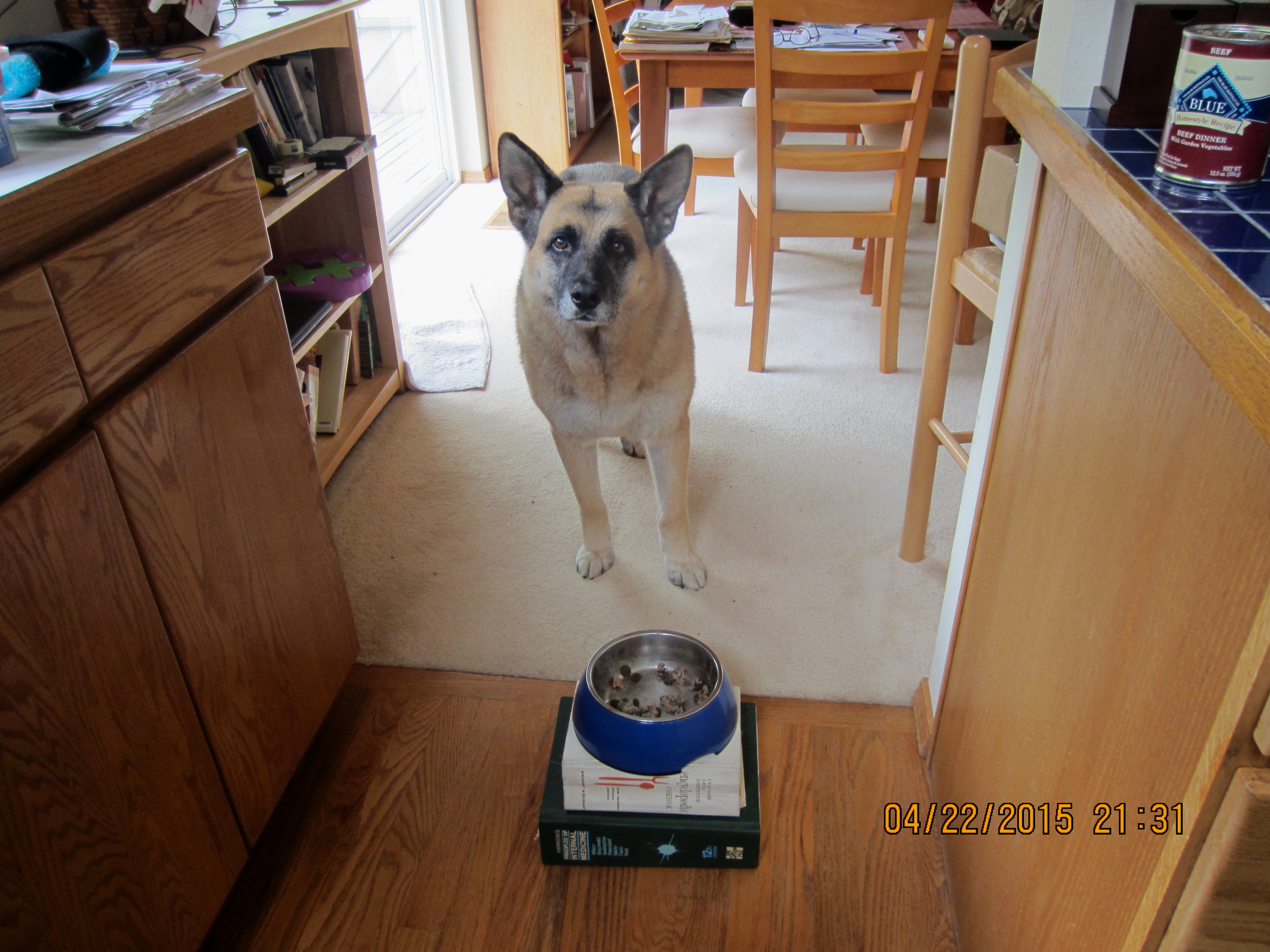Helping our older dogs through their senior years is one of the greatest joys we can experience in dog parenting. It’s important to remember that dogs aren’t concerned about their age. We are. They experience the process of aging without judgement or despair. However, because we can anticipate the complications of aging, we can monitor their health and activities and help them age in the best way possible.
Tips for senior dogs

- Every dog ages at their own rate depending on breed and size. But regular exercise, while ensuring that they maintain a healthy weight helps to keep them fit and happy.
- Senior dogs should be evaluated by the vet twice a year–or any time you notice a change in behavior or new symptoms. Many conditions that dogs experience in their later years are completely treatable or manageable, but the earlier a symptom is evaluated, the more likely that treatment will be successful. It’s important to keep in mind that the passage of time is different for us than it is for dogs, and that a month in a dog’s life is a significant amount of time.
- Holistic vets can also help to keep older dogs with chronic conditions comfortable by using herbs and supplements that Western vets are unfamiliar with.
- Pet insurance can be priceless when caring for your older dog. It’s best to get pet insurance when your dog is younger, because preexisting conditions are not covered by pet insurance. There are many amazing diagnostics and treatments available for dogs now, but they can cost thousands.
Exercise

- Daily exercise is important to maintain muscle strength both to support joints, and to keep joints lubricated and flexible. However, exercise tolerance can change quickly. In general, shorter, more frequent walks or hikes are better for older dogs than long hikes. Long walks on pavement may may bother arthritic joints. Watch for things such as lagging behind you, limping, and pain and stiffness after a walk. Adjust their activity accordingly and take your long hikes alone if you have to. Forcing dogs to exercise beyond their comfort level will cause more harm than good, but avoiding exercise altogether is just as bad.
- Swimming in a heated pool is a great way to exercise painful, arthritic joints and stretch and strengthen muscles all year round. The benefits will stay with your dog for days after the swim. We swam Tessie and Lola every other week for two years at Lap of Luxury in Lynden, and it made a huge difference to both of them. The benefit of one 30 minute swim would last for up to ten days.
- Massage and gentle stretches can help to increase blood supply and maintain range of motion.
Comfort

- Older dogs have more difficulty managing their temperature, so be careful not to leave them out in the heat or cold for long. Vera always wanted to lie outside on the icy deck, even when she was 13 years old and very thin. We’d set the timer for 10 minutes, then bring her inside to warm up. She’d always ask to go out again.

V relaxes on the icy deck. We’d set a timer and bring her in every 10 minutes to warm up. 
- Be sure your dog has a thick bed that doesn’t “bottom out” so he can be comfortable at night. If a dog’s appetite diminishes, he can, as Vera did, get very thin. We got Vera a new, beautiful bed when she was 12 years old, but the newness of it made her so anxious that she crawled on top of us in the night and tried to climb the wall behind our bed. I had to send it back. Oh well!
- Get ramps that allow your dog easy access to the furniture and the car. With the help of your vet, consider equipment such as wheelchairs for your dog or rear-end supports to help him up and down the stairs.
- If your dog has difficulty climbing the stairs to bed, consider sleeping downstairs with him.
- Watch for signs of pain when you groom or stroke your dog. Increased panting, licking or yawning, or looking at your hand when you touch certain areas, can be indicators of discomfort. Discuss with your vet or holistic vet.
- If your dog’s appetite dulls, definitely have your dog assessed by the vet. Vera had cancer toward the end of her life, and her appetite was very fickle. I offered her a different food with each meal. The fridge was crowded with treats for her. I would feed her sometimes from one of our pottery bowls or plates, sometimes from my hand, sometimes from a spoon. I would try several different treats offered in several different ways, eventually up to six times a day to get her to eat just a little. Until her last couple of days, I was almost always successful.
Vera wouldn’t eat from her regular bowl, but when placed on one of our dinner dishes, she cleaned the plate!
- Watch for signs of medication side effects such as dizziness, irritability, drowsiness or fatigue, anxiety, panting and pacing, even with medications your dog might have tolerated in the past. Tessie, our collie in Finding Vera, had a terrible time with tramadol and neurontin the last couple of months of her life, whereas she’d done very well with them for a couple of years before that.
- Piddle Pads or water-proof beds can help with incontinence.

Tessie in hospice
Enrichment
- Be motivated to give your dog mental enrichment and focused exercise daily. This keeps them mentally sharp and keeps their muscles limber and strong. It makes their lives worth living. If you’ve read “Finding Vera“, you know how limited Vera’s life was because of her anxiety which manifested as aggression. However, I was able to make up for her limitations right up until the day she died, by teaching her tricks and new skills, doing Nose Work, and allowing her choices within the scope of her limitations. Our play sessions were the highlight of her day.
- ACTIVITIES TO MENTALLY STIMULATE YOUR DOG:
- Buy a good book on dog tricks and learn them with your dog using lots of enthusiasm and easily digestible treats. Keep in mind that high-fat foods/ treats can predispose older dogs to pancreatitis (both Vera and Tess had pancreatitis at different times, and it’s a painful and potentially lethal illness).
- Obstacles: stepping through a ladder laid flat, circling around cones, chairs or table legs, navigating tunnels, targeting and triggering target buttons, placing front paws up on a low platform, etc. Use your imagination! As your dogs age, their tricks may need to be modified.


Vera had to modify her plant-pot walk the next year and only walked her front paws along the pots. She loved it just as much!

Adding a new puppy or dog to your household is always a choice that will certainly provide enrichment for your older dog, but your senior dog must be protected. Don’t depend on your older dog to correct your puppy. You can use ex-pens, baby gates, crates and tethering to accomplish this if you need to. Remember, older dogs may be grumpy and short-tempered so it’s in the best interest of the puppy or new dog in the household as well as your senior dog to keep them separated unless they are being carefully supervised–at least until they are very comfortable together and there is no friction in their relationship. We had to be extremely careful bringing Annie home to Vera. To find out how we did it, sign up for my newsletter.



Mia (age 14) will only eat dry food now if I put it directly on the floor; no bowl! She still likes sitting outside in the cold too!
LikeLike
They really know what they want when they get to that age, don’t they? I always wondered why V liked being outside in the freezing cold. I wondered if it had to do with her formative years of being chained outside in the elements. Did you have Mia as a puppy?
LikeLike
Our 12 yr old smooth collie stays outside in the cold and rain all the time. She has a dry doghouse and free access to inside, but outside in the rain is where she wants to be
LikeLike
That’s so interesting! Maybe some older dogs just love freshness of the air and enjoy watching over their kingdoms. I would have thought that with aging joints, and often the loss of muscle mass and body fat, that they’d choose the warm comfort of being inside.
LikeLike
On the other hand, when she is in the house, she most often sleeps with her head on the registers, no matter hot or cold air blowing. One day, We found her with her tags caught in the grill. She couldn’t move. Tags now in a zipper pouch on her collar.
LikeLike